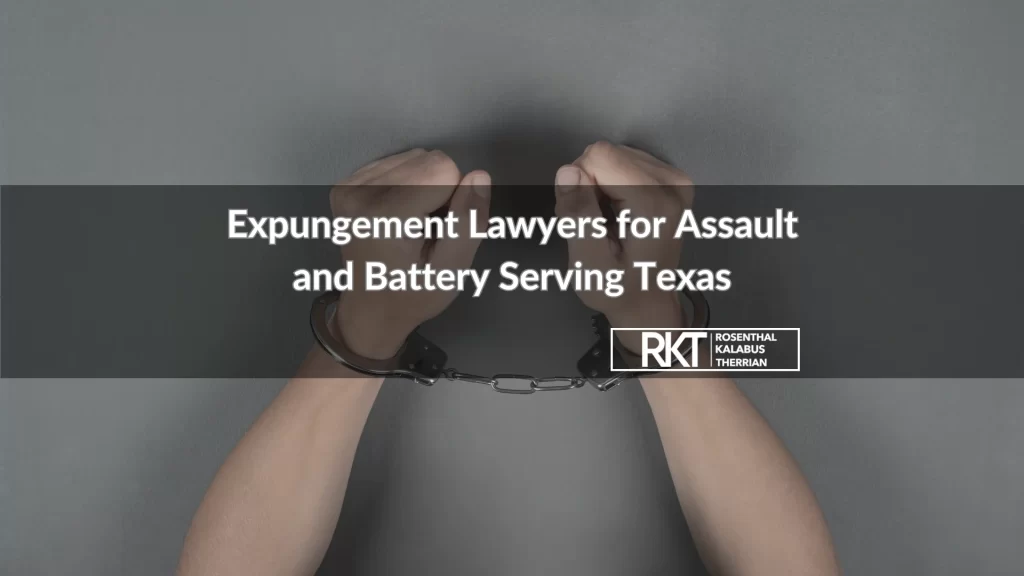
Arrests do not always lead to criminal charges, and criminal charges do not always lead to a conviction. However, these events stay on your record and can follow you for years. Fortunately, Texas law allows people who have been charged but not convicted to have the arrest or charge taken off their record. This process is called expungement.
While it is possible to expunge the record of an arrest or charge that did not lead to a conviction, it is impossible to expunge a conviction. Texas law allows an arrest record to be expunged on a Class C misdemeanor that results in a deferred adjudication after the defendant has completed their supervision. In some cases, it is possible to seal the records of a conviction with an order of non-disclosure. These efforts may reduce an arrest or charge’s effect on your life.
After expunction, you are allowed to deny the arrest or charges
 After a successful expunction of an arrest or criminal charge, you are legally allowed to deny any arrest or charge for that crime, except in rare cases. This is helpful when applying for a job or a new place of residence since many employers, landlords, and banks ask you to disclose any arrest or charge.
After a successful expunction of an arrest or criminal charge, you are legally allowed to deny any arrest or charge for that crime, except in rare cases. This is helpful when applying for a job or a new place of residence since many employers, landlords, and banks ask you to disclose any arrest or charge.
Expunction then becomes a powerful tool to clear your name and avoid the long-lasting consequences of an arrest record. If you were arrested or charged with a criminal offense and the charge was dismissed or found not guilty, you may want to seek expungement of the charge from your record.
Contact the dedicated and experienced Collin County expunction attorneys of Rosenthal Kalabus & Therrian to schedule a free and confidential consultation. You will meet with a knowledgeable criminal defense attorney who can advise you about your rights and options. They will also discuss the resources the firm can provide you to help you successfully obtain an expunction. Call our offices today at (972) 369-0577 for your free consultation.
What Are Assault and Battery?
Among the arrests or charges you may wish to have expunged are assault and battery. These are two different charges. Each offense has its own definition and punishment in Texas. Assault and battery are also considered “intentional torts.” These are intentional acts that lead to another person’s injury. This means that an individual charged with assault and battery can also be sued by the injured person in civil court for compensation for their injuries.
If you were charged with assault and battery and not convicted, expunging that charge from your record may help your case if any civil charges were filed against you. Assault charges can be brought when there is a threat of violence, and battery is included when bodily contact occurs. Texas penal code § 22.01 defines assault as when someone:
- Intentionally, knowingly, or recklessly causes bodily injury to another, including the person’s spouse.
- Intentionally or knowingly threatens another with imminent bodily injury, including the person’s spouse.
- Intentionally or knowingly causes physical contact with another when the person knows or should reasonably believe that the other will regard the contact as offensive or provocative.
Types of Assault Charges
Assault charges are classified as a Class A, B, or C misdemeanor or a first-degree, second-degree, or third-degree felony. The severity of the charge is based on the threat, any bodily injury, any other aggravating factors, and the person who was threatened. For example, an assault is a Class C misdemeanor if the person is threatened with harm or there is physical contact without other aggravating factors. It becomes a first-degree felony if the assault is against a public official, emergency worker, witness, or police officer.
In Texas, you may also be charged with aggravated assault. This is a more serious offense. The charge can be brought when the assault was knowingly or recklessly done to cause serious injury to another person.
One of two factors must be present for a charge of aggravated assault. The first is the infliction of serious bodily harm. This refers to long-term injuries that are not necessarily permanent but are considered serious. The second factor is the use or brandishing of a deadly weapon.
Legally, a weapon that can kill another person is considered deadly. This can include a metal pipe, rock, or viral infection like HIV. Depending on the situation, a person charged with aggravated assault faces a first-degree or second-degree felony charge. The penalties for an assault or aggravated assault can range from a $500 fine to fines up to $10,000 and two to 20 years in prison.
Why Do I Need an Attorney to Expunge My Charges?
 The court does not require that an attorney be the one to petition to have an arrest or criminal record expunged. However, using an experienced expunction lawyer for assault and battery can increase your chances of success. A criminal defense attorney can review the facts and determine whether you’re eligible. They can then help draft the petition and ensure the documentation and information submitted to the court is complete.
The court does not require that an attorney be the one to petition to have an arrest or criminal record expunged. However, using an experienced expunction lawyer for assault and battery can increase your chances of success. A criminal defense attorney can review the facts and determine whether you’re eligible. They can then help draft the petition and ensure the documentation and information submitted to the court is complete.
In some cases, if you have legal representation, you may not need to appear in court for the petition. This can be helpful if you can’t get time off of work or you no longer live in the area. In some circumstances, the prosecutor has the right to object or must consent to the petition. In this case, working with a criminal defense attorney may be crucial to your success.
Why Choose Rosenthal Kalabus & Therrian?
If you are seeking an expunction of an arrest or criminal record that was dismissed or of which you were acquitted, you want experienced legal representation on your side. This can make the process go more smoothly and increase your chances of success.
The criminal defense attorneys of Rosenthal Kalabus & Therrian have earned their reputation of being a leading criminal defense firm. We have two criminal law board-certified partners on our team. Board certification is granted to only one percent of attorneys in Texas. It demonstrates their substantial knowledge and experience in criminal law. Our legal team also has attorneys who have worked in the prosecutor’s office. This means we have considerable experience understanding how prosecutors may pursue your case. As a result, we can offer many resources when you hire us to protect your rights through the process.
Contact Our Expunction Lawyers for Assualt and Battery Today for a Free Consultation
If you are arrested, but no charges were filed, or if you were charged with a crime but found not guilty, you might be entitled to have your record expunged. Expunction can mean that you are no longer faced with the consequences of having an arrest or criminal charge on your record. This can significantly impact your ability to seek employment, housing, and education.
Call the experienced expunction lawyers for assault and battery of Rosenthal Kalabus & Therrian. We are ready to help determine your eligibility for expungement and walk you through the process. Our skilled attorneys can advise you about your rights and your options. Call us today at (972) 369-0577 or contact us online for a free, confidential consultation.